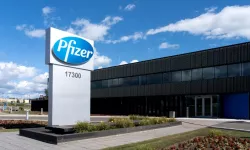Industry News

On Thursday, Ballad health system unveiled three Omnicell XR2 Central Pharmacy Dispensing robots at Bristol Regional Medical Center to enhance the operations of its pharmacy services. The robots are part of a central pharmacy dispensing system that improves safety, workflow and inventory optimization through automation, enabling pharmacy team members to focus on other aspects of care.
"The introduction of Omnicell XR2 robots for our Pharmacy Central Fill Services at Bristol Regional marks a transformative moment in our commitment to patient well-being,” said Marvin Eichorn, chief administrative officer for Ballad Health. “This leading-edge technology will not only streamline our medication management processes, but it is also designed to contribute to enhanced patient safety and cost-effectiveness."
The Omnicell XR2 robots are intended to bring a host of benefits to Ballad Health’s Pharmacy Central Fill Services and the entire health system, including:
· Decreasing the manual handling of medications by technicians and pharmacists
· Reducing expired medication waste by dispensing earliest-to-expire and optimizing inventory across Ballad Health
· Providing complete, real-time visibility to every dose and its expiration date
· Enhancing patient safety by leveraging 100% barcode scanning
"The Omnicell XR2 automation represents a significant leap forward for our Pharmacy Central Fill Services,” said Trish Tanner, chief pharmacy officer at Ballad Health. “With fewer touchpoints, these state-of-the-art robots will empower our team members to redirect their focus towards more clinical initiatives, ultimately enhancing the overall quality of patient care."
The selection of Bristol Regional to receive the Omnicell XR2 robots was based on several factors, with its central location in the Appalachian Highlands and proximity to the entire Ballad Health service area playing a crucial role. This positioning ensures Pharmacy Central Fill Services at Bristol Regional will be within a reasonable courier distance for all Ballad Health hospitals, facilitating swift and efficient medication distribution.
In a unique and creative approach to integrating the outcomes-driven technology into the workflow, Ballad Health invited team members to participate in naming the XR2 robots.
Given Bristol's rich musical heritage, particularly the 1927 Bristol Sessions that ignited the country music movement across America and the Birthplace of Country Music Museum, the theme chosen for the robots’ name and decal design is country music. Following a survey among team members, the selected names for the three XR2 robots pay homage to iconic singer-songwriters Dolly Parton, Johnny Cash and June Carter-Cash.
As Ballad Health prepared to launch the technology at Bristol Regional, they celebrated the impact the Omnicell XR2 robots are anticipated to have on patient care and operational efficiency during a team member event, where the robots’ names were also unveiled.
“By leveraging advanced technology, these robots will not only streamline our medication management processes, but are also designed to significantly enhance patient safety,” Tanner said.
“The expected reduction in medication errors, improved inventory management and increased focus on clinical initiatives should collectively contribute to a healthcare environment that is safer, more efficient and ultimately more patient-centric. We believe that embracing innovation in this manner aligns with our commitment to providing the highest standard of care for our patients across Ballad Health."
More information about the services and hospitals of Ballad Health is available at www.balladhealth.org.

FORT WORTH, TX - Omnicell, Inc. (Nasdaq: OMCL) (“Omnicell” or the “Company”), a leader in transforming the pharmacy care delivery model, today announced that the Board of Directors elected Eileen Voynick to the Board, effective January 5, 2024. Ms. Voynick fills the vacancy resulting from Sara J. White, a Class I director who stepped down from the Company’s Board of Directors, effective January 5, 2024. In addition, the Company announced that Vance Moore will not stand for reelection to the Company’s Board at Omnicell’s 2024 annual meeting of stockholders (the “2024 annual meeting”) and effective as of the 2024 annual meeting, the size of the Board will be reduced from ten to nine directors.
Ms. Voynick brings over three decades of experience driving sales and operations at global industry leaders, including in the healthcare technology industry, at the executive and board level. She most recently served as Chief Executive Officer of Sparta Systems Inc., a leading provider of enterprise-quality management software solutions. Prior to Sparta Systems, Ms. Voynick served as Chief Operating Officer at Allscripts Healthcare Solutions, Inc. (n/k/a Veradigm Inc., Nasdaq: MDRX), as Executive Vice President of global sales, services, and support at Misys Healthcare Systems, and in various management positions at Oracle, SAP, Siebel Systems, Gartner, Ariba, and Accenture. Ms. Voynick is currently board chair of AGS Health LLC, a revenue cycle management provider, and has held board positions for several other organizations, including Skydeck Acquisition Corp. (former Nasdaq: SKYAU), CDK Global, Inc. (former Nasdaq: CDK), r3, Advanced MD Health, Jefferson Health, Philadelphia University and Thomas Jefferson University.
“We are pleased to welcome Eileen to the Omnicell Board of Directors,” said Randall Lipps, chairman, president, chief executive officer, and founder of Omnicell. “Eileen is a widely respected leader with significant experience in the software, technology, and healthcare industries, as well as a proven track record creating value for stockholders, accelerating growth, driving operational excellence, and developing global businesses. I am confident that her skills will complement and strengthen our Board as Omnicell continues to focus on driving long-term value and delivering outcome-centric innovations to improve patient outcomes.”
Mr. Lipps continued, “I would like to thank Sara and Vance for their dedication and outstanding contributions to the Board. Over the years, they have provided valuable insights and counsel to support Omnicell in furthering our strategy.”
“Omnicell is at the forefront of delivering mission-critical medication management solutions, and I am honored to join the Board,” said Ms. Voynick. “As hospitals and health systems are relying on technology now more than ever to serve patients, I look forward to leveraging my background in software, healthcare, and operations and working alongside Randall and the rest of the Board as we continue to further our innovation agenda for the benefit of our customers and enhance stockholder value.”
Ms. Voynick has been appointed to the Board’s Corporate Governance Committee. Following the 2024 annual meeting, the Omnicell Board will be comprised of nine directors, eight of whom are independent, and all of whom bring a broad range of expertise and skills necessary to oversee and direct the Company’s business. Six of those independent directors have been added to the Board in the last four years.
About Omnicell
Since 1992, Omnicell has been committed to transforming pharmacy care through outcomes-centric innovation designed to optimize clinical and business outcomes across all settings of care. Through a comprehensive portfolio of robotics, smart devices, software, and expert services, Omnicell solutions are helping healthcare facilities worldwide to uncover cost savings, improve labor efficiency, establish new revenue streams, enhance supply chain control, support compliance, and move closer to the industry-defined vision of the Autonomous Pharmacy. To learn more, visit omnicell.com.
OMNICELL and the Omnicell logo are registered trademarks of Omnicell, Inc. or one of its subsidiaries.

GAITHERSBURG, MD - Emergent BioSolutions Inc. (NYSE:EBS) today announced that it has secured an indefinite-delivery, indefinite-quantity (IDIQ) procurement contract with a maximum value up to $235.8 million to supply BioThrax® (Anthrax Vaccine Adsorbed) for use by all branches of the U.S. military as Pre-Exposure Prophylaxis (PrEP) for anthrax disease. The new contract with the U.S. Department of Defense (DoD) and led by the Joint Program Executive Office for Chemical, Biological, Radiological and Nuclear Defense, is comprised of a five-year base agreement ending on September 30, 2028, and an additional five-year option that would extend the contract to September 30, 2033.
“As a part of our mission to protect and enhance lives, Emergent is proud to continue supporting and preparing our nation’s service members who have a high risk of exposure to anthrax bacteria by supplying BioThrax vaccine,” said Paul Williams, senior vice president, products head at Emergent. “This new contract award is a testament to the importance of Emergent’s medical countermeasures portfolio, and we look forward to delivering on our commitments to the U.S. DoD.”
Under the initial five-year IDIQ contract, there is a guaranteed purchase minimum of $20.1 million, with future orders estimated to be at least $20 million for each following year for a total award value up to $235.8 million.

Inova is Northern Virginia’s leading nonprofit healthcare provider with more than 2 million patient visits each year through an integrated network of hospitals, primary and specialty care practices, emergency and urgent care centers, outpatient services, and destination institutes. Screening of controlled substance waste with WasteLog™ will be introduced at Inova Fair Oaks Hospital, a 174-bed acute care community hospital serving the rapidly growing suburbs of Northern Virginia.
Lars Gusch, CEO of Pharmacolog comments: “I’m excited that Pharmacolog’s journey with WasteLog™ enhancing the Drug Diversion Prevention Programs of our customers continues with this latest order from our new customer in Virginia.”
About Pharmacolog
Pharmacolog provides solutions and products that enhance work efficiency and safety when preparing injectable medication. Our goal is to help prevent medication errors and ensure maximum medication efficacy when treating patients with powerful yet potentially harmful injectable drugs. Pharmacolog’s products help staff at pharmacies and hospital wards minimize the risk of errors in the compounding process. Furthermore, by verifying that drugs and narcotics used in surgery have not been tampered with, our solutions also make a vital contribution to preventing drug diversion.
The following trademarks are owned and protected by Pharmacolog i Uppsala AB: Pharmacolog™-logo, DrugLog™, WasteLog™, PrepLog™ and Pharmacolog Dashboard™.
Further information regarding the company is available at https://pharmacolog.com/.
The company's Certified Adviser is Mangold Fondkommission AB.

NEW YORK, NY - Pfizer Inc. (NYSE: PFE) today announced that it has received notice of an unsolicited mini-tender offer by TRC Capital Investment Corporation of Ontario, Canada to purchase up to 4 million shares of Pfizer common stock at a price of $27.35 per share in cash. TRC Capital Investment’s offer price of $27.35 per share is approximately 4.4 percent lower than the $28.61 closing share price of Pfizer’s common stock on December 27, 2023 – the business day prior to the date of the offer. The offer is for approximately 0.071 percent of the shares of Pfizer common stock outstanding as of the December 28, 2023 offer date.
Pfizer does not endorse TRC Capital Investment’s unsolicited mini-tender offer and recommends that stockholders do not tender their shares in response to TRC Capital Investment’s offer because the offer is at a price below the current market price for Pfizer’s shares and subject to numerous conditions. Pfizer is not affiliated or associated in any way with TRC Capital Investment, its mini-tender offer or its offer documentation.
TRC Capital Investment’s has made many similar mini-tender offers for shares of other companies. Mini-tender offers seek to acquire less than 5 percent of a company’s shares outstanding, thereby avoiding many disclosure and procedural requirements of the U.S. Securities and Exchange Commission (SEC) that apply to offers for more than 5 percent of a company’s shares outstanding. As a result, mini-tender offers do not provide investors with the same level of protections as provided for larger tender offers under U.S. securities laws.
The SEC has cautioned investors that some bidders making mini-tender offers at below-market prices are “hoping that they will catch investors off guard if the investors do not compare the offer price to the current market price.” More on the SEC’s guidance to investors on mini-tender offers is available at www.sec.gov/investor/pubs/minitend.htm.
Pfizer urges investors to obtain current market quotations for their shares, to consult with their broker or financial advisor and to exercise caution with respect to TRC Capital Investment’s offer. Pfizer recommends that stockholders who have not responded to TRC Capital Investment’s offer take no action. Stockholders who have already tendered their shares may withdraw them at any time prior to the expiration of the offer, in accordance with TRC Capital Investment’s offer documentation. The offer is currently scheduled to expire at 12:01 a.m., New York City time, on January 30, 2024. TRC Capital Investment may extend the offering period at its discretion.
Pfizer encourages brokers and dealers, as well as other market participants, to review the SEC’s letter regarding broker-dealer mini-tender offer dissemination and disclosure at www.sec.gov/divisions/marketreg/minitenders/sia072401.htm.
Pfizer requests that a copy of this news release be included with all distributions of materials relating to TRC Capital Investment’s mini-tender offer related to shares of Pfizer common stock.

Cleveland Clinic has appointed Lindsey B. Amerine, Pharm.D., MS, BCPS, CPEL, FASHP, as Chief Pharmacy Officer. She will begin on February 26 and will oversee enterprise pharmacy initiatives.
Dr. Amerine joins Cleveland Clinic from UNC Health, where she most recently served as Interim Chief Pharmacy Officer and Vice President of Pharmacy from May to September last year and System Executive Director of Pharmacy since February 2022 overseeing clinical, operational, and financial services.
Dr. Amerine will lead more than 1,500 full-time pharmacy professionals in Ohio and Florida, and will report to Donald A. Malone Jr., M.D., Cleveland Clinic Executive Vice President and President of the Northeast Ohio Market.
“Dr. Amerine is a thoughtful and innovative healthcare leader with vast experience in pharmacy operations,” said Dr. Malone. “Under her leadership, Cleveland Clinic will continue its world-leading pharmacy practices and enhance our services with automation and technology.”
Dr. Amerine has held other leadership roles at UNC Health, including coordinator for the Health-System Pharmacy Administration and Leadership residency program, and was associate professor of clinical education at the University of North Carolina Eshelman School of Pharmacy.
“Cleveland Clinic’s pharmacy operations are highly regarded,” said Dr. Amerine. “I’m excited to join the team and continue to look for new ways to serve patients and innovate in this ever-changing pharmacy environment.”
Throughout her career, Dr. Amerine has been active with the American Society of Health-System Pharmacists (ASHP), where she serves as the immediate past chair of ASHP’s section of pharmacy practice leaders and was selected as a fellow of ASHP in 2020. She has over 50 peer-reviewed publications and presents on pharmacy practice topics nationally and internationally.
She received the 2012, 2013, 2015 and 2022 ASHP Best Practice Awards, 2015 ASHP Foundation Literature Award, 2017 ASHP Foundation Excellence in Medication Safety Award, and 2018 and 2019 Association of Community Cancer Centers (ACCC) Innovator Awards.
A Nebraska native, Dr. Amerine received her Doctor of Pharmacy degree from the University of Wyoming School of Pharmacy and her Master of Science degree, with a focus on health-system pharmacy administration, from the University of North Carolina Eshelman School of Pharmacy.
Allison Riffle, Pharm.D., MS, has served as Cleveland Clinic’s interim Chief Pharmacy Officer since April 2023.

PARIS, FRANCE - Brian Foard, a healthcare industry veteran and Sanofi leader in the U.S., has been named Head of the company’s Specialty Care Global Business Unit (GBU). With this appointment, which is effective immediately, Brian becomes a member of Sanofi’s Executive Committee.
Brian has been interim Head of the GBU since September 2023 while also serving as Head of Specialty Care North America and U.S. Country Lead. Brian, who has more than 20 years of specialty biopharma experience, has been at the helm of the successful launch of Dupixent® in more than 50 countries across multiple indications and age groups prior to his current role.
Paul Hudson, Chief Executive Officer, Sanofi
“I am very excited to have Brian join our Executive Committee. He is clearly one of our leaders who has been actively contributing to the success of our Play to Win strategy while embracing our culture and values. His ability to motivate teams and inspire success across the globe is underpinned by his determination, strategic mindset and dedication to continue to transform Sanofi into a world leading immunology company. Brian’s best-in-class launch of Dupixent will help to set our roadmap for the first- and best-in-class molecules we are preparing to launch in the coming years.”
Brian joined Sanofi in March 2017 as the Global Head of Dermatology and Respiratory, and held roles of increasing responsibility, including as Head of Global Immunology for Sanofi. He began his career with Galderma and spent more than 10 years in the U.S. before relocating to Paris to lead global marketing and launch readiness. During his time at Galderma, Brian also served in roles including General Manager for Australia & New Zealand and Vice President & General Manager of the global prescription business unit.
Brian received a degree in business from East Carolina University and has completed an executive education course at Wharton. He will be based in Cambridge, Massachusetts.
Brian Foard, Executive Vice President, Head of Specialty Care, Sanofi
“I am incredibly excited to take on this global role as Sanofi continues to drive innovation and deliver for patients. Under Paul’s leadership and his Play to Win strategy, Sanofi has set out on a course built for success and Specialty Care is at the core of the company’s ambitions. With this vision, and by doubling down on this work, we will continue to chase the miracles of science to improve people’s lives.”

RAHWAY, NJ & SAN FRANCISCO, CA - Merck (NYSE: MRK), known as MSD outside of the United States and Canada, and Harpoon Therapeutics, Inc. (Nasdaq: HARP) today announced that the companies have entered into a definitive agreement under which Merck, through a subsidiary, will acquire Harpoon for $23.00 per share in cash for an approximate total equity value of $680 million.
“At Merck, we continue to enhance our oncology pipeline through strategic acquisitions that complement our current portfolio and advance breakthrough science to help address the needs of people with cancer worldwide,” said Dr. Dean Y. Li, president, Merck Research Laboratories. “This agreement reflects the creativity and commitment of scientists and clinical development teams at Harpoon. We look forward to further evaluating HPN328 in innovative combinations with other pipeline candidates.”
Harpoon has developed a portfolio of novel T-cell engagers that employ the company’s proprietary Tri-specific T cell Activating Construct (TriTAC®) platform, an engineered protein technology designed to direct a patient’s own immune cells to kill tumor cells, and ProTriTAC™ platform, applying a prodrug concept to its TriTAC® platform to create a therapeutic T-cell engager that is designed to remain inactive until it reaches the tumor.
“At Harpoon, we have always been committed to advancing our cancer immunotherapy candidates to improve the lives of patients. With Merck’s recognized leadership in oncology clinical development and global commercial footprint, our lead candidate, HPN328, is well positioned moving forward,” said Julie Eastland, president and chief executive officer, Harpoon Therapeutics. “The talented, passionate and dedicated Harpoon team has made great progress over the past eight years in leveraging our research platform to develop an innovative suite of candidates, and we are pleased that Merck has recognized the significant potential of our pipeline. I want to personally thank all of our key stakeholders, including our entire team at Harpoon, trial participants, physicians and our shareholders, who have supported us.”
Harpoon’s lead candidate, HPN328, is a T-cell engager targeting delta-like ligand 3 (DLL3), an inhibitory canonical Notch ligand that is expressed at high levels in small cell lung cancer (SCLC) and neuroendocrine tumors. HPN328 is currently being evaluated in a Phase 1/2 clinical trial (NCT04471727) evaluating the safety, tolerability and pharmacokinetics of HPN328 monotherapy in patients with advanced cancers associated with expression of DLL3. The study is also evaluating HPN328 in combination with atezolizumab in patients with SCLC. In October 2023, Harpoon announced the presentation of positive interim tolerability and response data for HPN328 in certain patients with SCLC and neuroendocrine tumors.
Additional pipeline candidates include HPN217 targeting B-cell maturation antigen (BCMA), currently in Phase 1 clinical development for the treatment of patients with relapsed/refractory multiple myeloma, and several preclinical stage candidates, including HPN601, a conditionally activated targeting epithelial cell adhesion molecule (EpCAM) for the treatment of certain patients with EpCAM expressing tumors.
Under the terms of the agreement, Merck, through a subsidiary, will acquire all outstanding shares of Harpoon Therapeutics, Inc. for a price per share of $23.00 in cash. The Board of Directors of Harpoon has unanimously approved the transaction. Closing of the acquisition is subject to certain conditions, including approval of the merger by Harpoon’s stockholders, the expiration of the waiting period under the Hart-Scott-Rodino Antitrust Improvements Act, and other customary conditions. The transaction is expected to close in the first half of 2024 and will be accounted for as an asset acquisition. Merck expects to record a charge (non-tax deductible) of approximately $650 million, or approximately $0.26 per share, that will be included in non-GAAP results in the quarter that the transaction closes.

BRIDGEWATER, NJ - Amneal Pharmaceuticals, Inc. (Nasdaq: AMRX) (“Amneal”) today announces that it has launched 39 new retail and injectable medicines in 2023, as compared to 26 new launches in 2022.
In the fourth quarter of 2023, Amneal launched 13 new products, including 5 injectables. New injectable products added include potassium phosphate vials, tranexamic acid and esmolol intravenous bags. These launches provide a strong foundation for higher injectable revenues going forward. In addition, Amneal launched several key new retail products in the fourth quarter, including spironolactone suspension with 180-day exclusivity, valsartan and hydrochlorothiazide tablets, and icosapent capsules.
“We are pleased to have brought an impressive number of new products to market in 2023,” said Dr. Srinivas Kone, Senior Vice President, Generics R&D. “Our R&D portfolio prioritizes complex and high-value products that provide better access to affordable medicines for providers and patients.”
About Amneal
Amneal Pharmaceuticals, Inc. (Nasdaq: AMRX), headquartered in Bridgewater, NJ, is a fully integrated global pharmaceuticals company. We make healthy possible through the development, manufacturing, and distribution of a diverse portfolio of over 270 pharmaceutical products, primarily within the United States. In its Generics segment, the Company is expanding across a broad range of complex product categories and therapeutic areas, including injectables and biosimilars. In its Specialty segment, Amneal has a growing portfolio of branded pharmaceuticals focused primarily on central nervous system and endocrine disorders, with a pipeline focused on unmet needs. Through its AvKARE segment, the Company is a distributor of pharmaceuticals and other products for the U.S. federal government, retail, and institutional markets. For more information, please visit www.amneal.com.
Cautionary Statement on Forward-Looking Statements
Certain statements contained herein, regarding matters that are not historical facts, may be forward-looking statements (as defined in the U.S. Private Securities Litigation Reform Act of 1995). Such forward-looking statements include statements regarding management’s intentions, plans, beliefs, expectations, financial results, or forecasts for the future, including among other things: discussions of future operations, including international expansion; expected or estimated operating results and financial performance; the Company’s growth prospects and opportunities as well as its strategy for growth; product development and launches; the successful commercialization and market acceptance of new products, and other non-historical statements. Words such as “plans,” “expects,” “will,” “anticipates,” “estimates,” and similar words, or the negatives thereof, are intended to identify estimates and forward-looking statements.
The reader is cautioned not to rely on these forward-looking statements. These forward-looking statements are based on current expectations of future events, including with respect to future market conditions, company performance and financial results, operational investments, business prospects, new strategies and growth initiatives, the competitive environment, and other events. If the underlying assumptions prove inaccurate or known or unknown risks or uncertainties materialize, actual results could vary materially from the expectations and projections of the Company.
Such risks and uncertainties include, but are not limited to: our ability to successfully develop, license, acquire and commercialize new products on a timely basis; the competition we face in the pharmaceutical industry from brand and generic drug product companies, and the impact of that competition on our ability to set prices; our ability to obtain exclusive marketing rights for our products; our ability to manage our growth through acquisitions and otherwise; our revenues are derived from the sales of a limited number of products, a substantial portion of which are through a limited number of customers; the continuing trend of consolidation of certain customer groups; our dependence on third-party suppliers and distributors for raw materials for our products and certain finished goods; our ability to complete the proposed holding company reorganization on the anticipated timeline or at all and to realize the expected benefits of such reorganization; our substantial amount of indebtedness and our ability to generate sufficient cash to service our indebtedness in the future, and the impact of interest rate fluctuations on such indebtedness; our ability to secure satisfactory terms when negotiating a refinancing or other new indebtedness; our dependence on third-party agreements for a portion of our product offerings; legal, regulatory and legislative efforts by our brand competitors to deter competition from our generic alternatives; risks related to federal regulation of arrangements between manufacturers of branded and generic products; our reliance on certain licenses to proprietary technologies from time to time; the significant amount of resources we expend on research and development; the risk of product liability and other claims against us by consumers and other third parties; risks related to changes in the regulatory environment, including U.S. federal and state laws related to healthcare fraud abuse and health information privacy and security and changes in such laws; changes to Food and Drug Administration product approval requirements; the impact of healthcare reform and changes in coverage and reimbursement levels by governmental authorities and other third-party payers; our potential expansion into additional international markets subjecting us to increased regulatory, economic, social and political uncertainties, including recent events affecting the financial services industry; our ability to identify, make and integrate acquisitions or investments in complementary businesses and products on advantageous terms; the impact of global economic, political or other catastrophic events; our ability to attract, hire and retain highly skilled personnel; our obligations under a tax receivable agreement may be significant; and the high concentration of ownership of our Class A Common Stock and the fact that we are controlled by the Amneal Group. The forward-looking statements contained herein are also subject generally to other risks and uncertainties that are described from time to time in the Company’s filings with the Securities and Exchange Commission, including under Item 1A, “Risk Factors” in the Company’s most recent Annual Report on Form 10-K and in its subsequent reports on Forms 10-Q and 8-K. Investors are cautioned not to place undue reliance on any such forward-looking statements, which speak only as of the date they are made. Forward-looking statements included herein speak only as of the date hereof and we undertake no obligation to revise or update such statements to reflect the occurrence of events or circumstances after the date hereof.

Advance Market Analytics published a new research publication on "Self service Pharmacies Market Insights, to 2028" with 232 pages and enriched with self-explained Tables and charts in presentable format. In the Study you will find new evolving Trends, Drivers, Restraints, Opportunities generated by targeting market associated stakeholders. The growth of the Self service Pharmacies market was mainly driven by the increasing R&D spending across the world.
Some of the key players profiled in the study are: Medavail (Canada), Aila tech (United States), imageHOLDERS (United Kingdom), Medifriend RX (United States), Bd Rowa (United States), PARTTEAM & OEMKIOSKS (Portugal), Spot RX (United States) and Smart RX Systems (United States).
Get Free Exclusive PDF Sample Copy of This Research at https://www.advancemarketanalytics.com/sample-report/202407-global-self-service-pharmacies-market?utm_source=OpenPR&utm_medium=Suraj
Scope of the Report of Self service Pharmacies:
Self-service pharmacies are facilities within a healthcare setting or standalone locations that allow individuals to access pharmaceutical products and over-the-counter medications without direct assistance from a pharmacist or healthcare professional. These pharmacies are designed to provide convenience and accessibility for customers to obtain medications, health supplies, and sometimes wellness products without requiring direct interaction with pharmacy staff. Customers can browse aisles, select their desired items, and proceed to self-checkout counters or automated systems to complete their purchases. Self-service pharmacies typically offer a range of non-prescription medications, health aids, vitamins, and personal care items, allowing customers to quickly and independently fulfill their immediate healthcare needs. While self-service pharmacies offer convenience, they may also have staff or on-call pharmacists available for consultations or inquiries, ensuring that customers have access to professional advice when needed.
The titled segments and sub-section of the market are illuminated below:
by Type (Patient Facing, Professional Data Feeding), Application (Check-Out, Ordering Repeat Prescriptions, Identity Verification, Stock Control), Features (Digital Forms, Check-In Module, Card Reader, Payment Options, UV-C Disinfection, IR Temperature Sensing, Label Printing), End User (Hospital, Retail Pharmacies, Clinics, Other)
Market Drivers:
Surge in Demand in Efficient and Quick Customer Service at Pharmacies and Hospitals, Rise in Demand in Self-care Diagnostic and Self-care Dispensing and Surge in Demand in Faster Safer and More Accurate Drug Distribution
Market Trends:
Uses of Artificial Intelligence in Self Service Pharmacies
Opportunities:
Continuous Growth in Digitalization, Increasing Growth in Healthcare Infrastructure, Rising Number of Pharmacies over the World and Limited Customization of Kiosk Machines for Self-service Pharmacies
Self-service Pharmacies Market is a valuable source of guidance for individuals and companies.